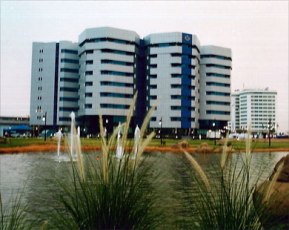Sudan’s central bank stepping in to halt quick deterioration of local currency
June 2, 2010 (KHARTOUM) — The Central Bank of Sudan announced today that it is taking new measures to stabilize the currency market following a sharp drop in the exchange rate of the pound versus the U.S. dollar.
 The highest financial authority said in a statement that it will inject more foreign currencies into the market and make it available to banks in order to meet client needs particularly to import goods.
The highest financial authority said in a statement that it will inject more foreign currencies into the market and make it available to banks in order to meet client needs particularly to import goods.
Furthermore, Sudan’s central bank said it will tighten control of exchange bureaux to enforce rules on selling foreign currencies and crackdown on the black market as well.
Because of banking difficulties, many importers prefer to buy foreign currency at exchange bureaux and carry suitcases of hard cash outside Sudan to purchase goods, bypassing Sudan’s banks.
Sudanese businessmen often complain that lack of hard currency is restricting their ability to import and have led to low supply of some products raising its prices to the customer and therefore curtailing its demand.
Sudan has already restrictions on selling foreign currencies to individuals and entities in excess of what is needed for personal or business needs and also requires heavy documentation to justify it.
The central bank revoked the license of Al-Aroos bureaux last month citing multiple violations of regulations governing the work of trading in foreign currencies.
Last year the International Monetary Fund (IMF) released a report saying that Sudan had a sharp drop in foreign exchange reserves across the years from $2 billion in mid-2008 to $300 million in March 2009, which covers only 2 weeks of imports for the East African nation.
The IMF said this was caused by the fall in oil prices, which is Sudan’s main export, and the “heavy” intervention by the central bank to sustain the exchange rate. Oil revenue accounts for 80% of cash inflows with the rest coming primarily from foreign investments.
The fast depletion in foreign reserves has prompted Sudan’s central bank to impose a cap on the amount of hard currency available to individuals travelling abroad.
Sudan is under US sanctions imposed since 1997 that includes 31 government owned companies which limits their access to US financial system and US dollars.
The central bank governor revealed in an interview last month that Sudan intends to drop the pound’s peg to the US dollar and replace it with a basket of international currencies by year’s emd.
(ST)

Ayuen Buol mum
Sudan’s central bank stepping in to halt quick deterioration of local currency
I have already predicted that Sudan exchange rates would be in trouble if the oil production fell. Why, because dollar should not compete with local currency like $1 = 2 pound which will affect the local market, if the dollar raise or fell. My suggestion is for the Central Bank to raise $1 = 20 pound so that local market will not be affected if the dollar fell in the long run. In addition, there is a high inflation right now in the global market and this will derive the local markets that are not monitor in term of macroeconomic stability. Even though, the central bank injected more money in the local economy, it will cause high inflation and will not be good news for the local market as well.
Ayuen Mum, Business student
Kuer Dau Apai
Sudan’s central bank stepping in to halt quick deterioration of local currency
Falsifying Accuses!!
Foreign exchanges always raise the financial standard instead of causing sharp drop rate as said in the article. The daily rating of the bank does not have to be always reliance on the oil price and if so, then what about the countries without oil product? Why do their bank rates never fall into such crises?
The real matter is the unnecessary transactions and loaning systems. It may be brought about by the lack of skill and inadequate education as the staffs are just employed without being qualified in the so-called field of studies. But because I know him/her and he/she is my relatives.
Let base our employment on what does she/he know about a particular field.
Thank all by Kuer Dau Apai